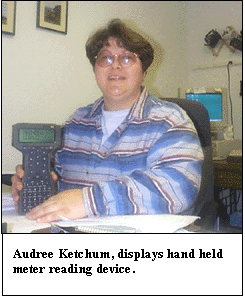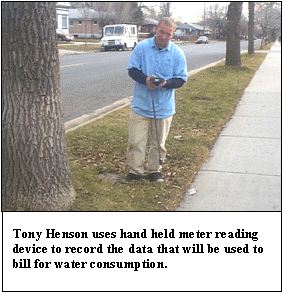|
Accurate and efficient meter reading has long been an important part of the utility business. Water meters account for water usage and have been described as the “cash register” of the utility. Not only do meters provide the information by which customers are billed for service; meters also provide an equitable method of allocating the cost of service. The more water is consumed, the higher the billing. Salt Lake City has been metered for over 85 years.
City officials decided early on to meter water consumption,
both as a means of determining use and billing, and equally as
important to encourage conservation of a limited water supply in the
semi-arid Salt Lake Valley. |
 |
In 1913, Chas F. Barrett, Superintendent of Waterworks recommended that all connections be metered. He wrote, “European cities universally have long since seen the absurdity of selling water by flat rate and are now using water meters which measure the quantity used by each customer. The result of this logical and sensible method is that an ample supply with adequate pressure is maintained at all times; everybody is treated alike in that he pays for what he uses and not for what his neighbor may waste.” As a result Salt Lake City embarked on a program of metering all its water connections. Today 100 percent of the nearly 90,000 accounts are metered, with each meter read and billed each month.
Meter reading and recording the data has not changed much until recently. In the past the meter reading was manually recorded in a meter route book, then entered by hand into the billing system. Since 1968, the meter reading was transferred to a computerized billing system, the bill prepared and mailed to each customer.
This year the Department decided to modernize its meter reading system. During the first six months of 1998, the meter reading division developed a pilot program to test the Itron FS3 hand held meter reading system for reading water meters. This technology is not new; however, the Department has delayed the purchase until all the “bugs” were worked out. It was decided that 1998 was the year to change the age-old manual hand written meter book.
The Department purchased one hand held unit
in January 1998. The computer
programming was successfully developed, and by July 1, 1998, all meter
readers were equipped and reading using the new system.
At the same time, the readers were each assigned a permanent meter
reading route. In the past,
the routes were rotated in an effort to provide a reliable auditing
system.
Audree Ketchum, Senior Water Meter Reader, is
responsible for converting the manual system to the new system. “The
success of the system is measured in increased production and decreased
reading errors because meter readers are no longer required to enter
written reads in a meter book and take time to calculate consumption,”
says Ms Ketchum. In addition the readers have been given ‘ownership’ of
their meter reading routes allowing them to become familiar with the
location of all meters. “Now,” she adds, “under this change, the
meter reader is responsible for each meter box in their assigned area,
which is an additional benefit.”
Efficient and accurate transfer of data is the second part of this improved system. Data is now downloaded from the meter reading device directly into the billing system, which replaces the manual entry of data from the old style meter books.
|
The success of the new system is directly related to the dedication of Phillip Lynch who programmed the new system and worked out all the glitches that kept cropping up. Both the meter reading division and the billing division had input into the programming and suggested changes to enhance the system and meet their individual needs. The Department is
confident of the success of the new meter reading program.
According to Ms Ketchum, “the supervisors and meter readers
have a “failure is not an option” attitude, which prohibits the
possibility of failure.” Audree Ketchum can be contracted by calling 801-483-6775. Or e-mail audree.ketchum@ci.slc.ut.us |
 |